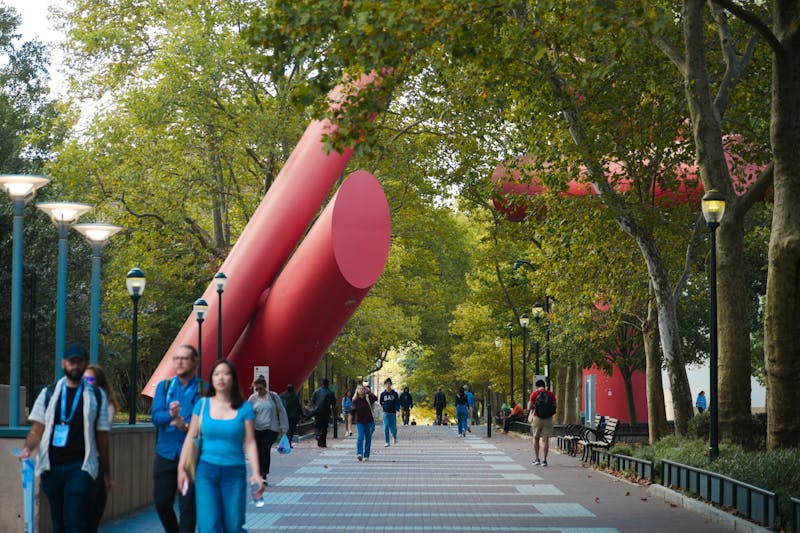It's nine on Sunday morning and I step into the big black emptiness of Annenberg's Harold Prince Theatre. The stage is bare except for the ghost light, a solitary light bulb on a stand centerstage. According to theater superstition, leaving this bulb lit wards off a vacant theater's ghosts. But this theater is full of ghosts for me, steeped in memories of past plays and friendships, exaltation and heartbreak -- the drama of theater production. Any given Sunday, one or more student theater groups is loading all of their sets, costumes, props and other elements into campus theaters. The event, called load-in, is a grueling, 15-hour process where tempers flare and crises occur regularly as the production team scrambles to complete their show's technical elements. The fact that student-run groups survive the catastrophes of load-in is truly inexplicable. Stars lose their voices, pit bands mutiny and directors ditch the production as the hours to opening night tick away. On this Sunday, the Pennsylvania Players are loading in their production of Children of Eden, a musical exploration of the Genesis stories. By 10:30 a.m., cast and crew swarm on the stage, assembling the prettily painted puzzle that will become our set. High above the stage, the crew members secure heavy theater lights with wrenches hanging from their belt loops and rolls of cable slung over their shoulders. I pass by the director and the makeup girls, who are trying to fashion a silky wig on the lead actress. I check in with the props designer, who has been hot-gluing everything in sight. She is detailing a bright green apple and gestures to a flask of emerald glitter that will complete the fake fruit. As I continue down the hallway, I hear voices soaring in harmony behind the rehearsal room's closed doors. The cast has been practicing 20 hours a week for a month and a half but now have only three rehearsals to adjust to the new environment. The melody grinds to a halt as the musical director admonishes the group, "You missed your entrance!" They start the number again. In the costume room, the student seamstresses, giggling over needle and thread, are a bit punchy after sewing two dozen identical skirts. I nab scissors and retreat to the theater to finish my contribution to the show: a big snake head for the scene between Eve and Eden's infamous serpent. Up close, this thing looks like a dilapidated sock puppet stuck together with chewing gum. But to the audience, it will take on mischievous life. That's the magic of the theater: The final ingredient in the recipe is always the audience's willingness to engage in the fantasy. Their imagination will transform wood and cotton into stone and silk. After a dinner break, I amble up to the lighting grid, a harrowing lattice of catwalks that criss-cross 26 feet above the stage below. My fellow lighting assistants and I trade stories of load-ins past. There was the night during a Penn Players tech week when a techie focused 100 lights in a single hour, the time it usually takes to do 20. Then there was the swimming pool that Quadramics constructed -- complete with water -- in this theater. Dangling my feet over the grid's edge, I watch my fellow crew members touch up the set, and marvel at our teamwork. Penn student theater has given us the opportunity to realize our dreams and ambitions in a product of our own creation. This process and this show are all ours. When, on Thursday night, we welcome in the audience from their busy lives, the drudgery of reality will melt away into the fantasy world we have created for them. As the clock strikes midnight, our post-load-in meeting begins. Through contact lenses cemented to my pupils, I scan the crowd of tired friends. They are more than fatigued -- they are deflated. Though bruised, bandaged and sprawled out on couches like rag dolls, we plan to be back at nine the following morning. It's been a good load-in. How we spin the madness and mayhem into a finished production might be magic, but why we give our blood, sweat and tears is no mystery. We do this because we love it. Once the show closes at the end of the week, and we laboriously strike set, lights and costumes, the theater will be as blank as we found it exactly one week before -- with only the lone light bulb to scare away our ghosts.
The Daily Pennsylvanian is an independent, student-run newspaper. Please consider making a donation to support the coverage that shapes the University. Your generosity ensures a future of strong journalism at Penn.
DonatePlease note All comments are eligible for publication in The Daily Pennsylvanian.







